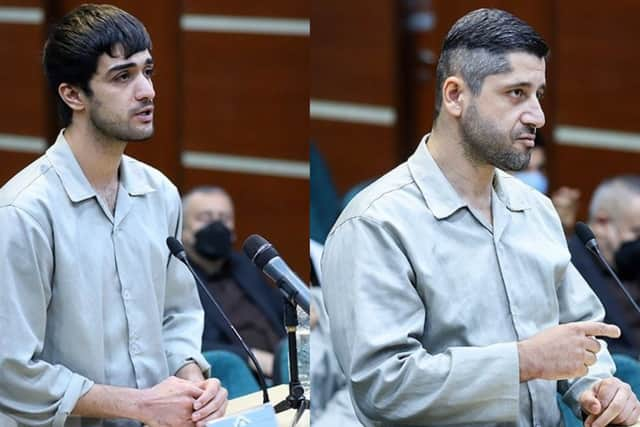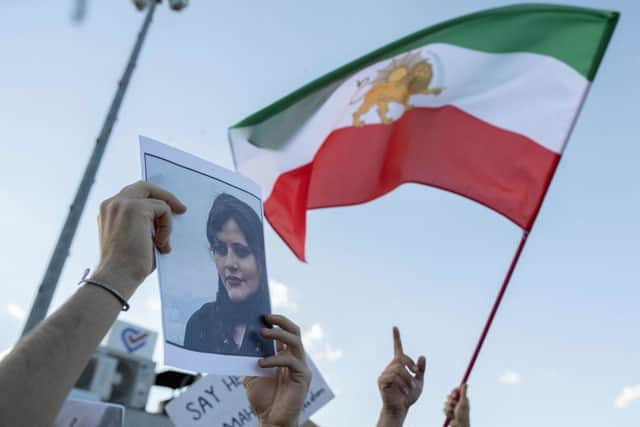Iran: two men hanged after ‘sham trials’ amid crackdown on protests sparked by death of Mahsa Amini
and live on Freeview channel 276
Iran has carried out two more death sentences in connection with the anti-government protests which have swept across the country. This takes the total number of known executions to four.
Mohammad Mehdi Karami, a karate champion, and Seyed Mohammad Hosseini, a volunteer children’s coach, were hanged on Saturday (7 January) after allegedly taking part in anti-regime protests. The nationwide unrest was first sparked in September 2022, when 22-year-old Mahsa Amini was detained for wearing her hijab “improperly” and subsequently died in police custody.
Advertisement
Hide AdAdvertisement
Hide AdBoth men were convicted in December 2022 of killing Seyed Ruhollah Ajamian, a member of the country’s Basij paramilitary force, according to Iran’s news agency Mizan. They launched appeals against the conviction, saying they had been tortured into giving false confessions, but Iran’s Supreme Court upheld the death sentences on 3 January.
The judiciary said in a statement on Saturday (7 January): “Mohammad Mehdi Karami and Seyyed Mohammad Hosseini, principal perpetrators of the crime that led to the unjust martyrdom of Ruhollah Ajamian were hanged this morning.”
Mohammad Hossein Aghasi, a lawyer advocating for Mr Karami, said that he was not permitted to speak to his family before his execution. Mr Hosseini’s lawyer Ali Sharifzadeh Ardakani said his client had been severely tortured to extract confessions which had “no legal basis”. Mr Hosseini was reportedly beaten with his hands and feet tied up, kicked in the head until he passed out, and subjected to electric shocks.


Human rights group Amnesty International has denounced the trials as a “sham”, while the United Nations’ human rights office urged Iran to “halt all executions”. UK Foreign Secretary James Cleverly meanwhile called the executions “abhorrent” and summoned Iran’s most senior British-based diplomat.
Advertisement
Hide AdAdvertisement
Hide AdCleverly said: “Today I have summoned the Iranian charge d’affaires to condemn in the strongest possible terms the abhorrent executions we witnessed over the weekend. The Iranian regime must end its campaign of brutal repression and start listening to the concerns of its people.”
The latest executions come just weeks after Mohsen Shekari and Majidreza Rahnavard, both 23, were convicted of “enmity against God” and killed for their involvement in the protests. Mr Shekari’s uncle Mahmoud Shekari told The Guardian that after his nephew’s death, authorities had “started a familiar game to torture his family” by not releasing his body.
Similarly, Mr Rahnavard’s mother was allowed to visit him prior to his death but was given no indication that he would be publicly hanged from a construction crane the following day.
According to CNN, as many as 41 more protesters have received death sentences in recent months - although the true number could be much higher. Three of these are believed to be from the same case as Mr Karami and Mr Hossein.
Advertisement
Hide AdAdvertisement
Hide AdMeanwhile, at least 516 demonstrators, including 70 children, have been killed as Iran’s ‘morality police’ violently cracks down on protesters - with a further 19,262 arrested, the Human Rights Activists’ News Agency said. Many of those who have been detained have reportedly been subjected to enforced disappearance, torture, and other ill-treatment. Officials in Iran describe the protests as “riots.”


The British Committee for Iran Freedom has called on the international community to sever ties with Iran and “unequivocally condemn this act of barbarism”. They wrote: “We believe that under such circumstances, the international community, especially European countries, should sever all ties with the Iranian regime and predicate a return to normal diplomatic relations on an end to the execution and suppression of the Iranian people who are demanding their rights for fundamental change.”
Azadeh Zabeti, Co-President of the Committee of Anglo-Iranian Lawyers, previously told the UK government to take “robust and firm measures against the tyrants and oppressors of Iran” - which included closing the Iranian Embassy in London. She warned it is a “threat” to the UK’s “democracy, way of life, and national security”.
Comment Guidelines
National World encourages reader discussion on our stories. User feedback, insights and back-and-forth exchanges add a rich layer of context to reporting. Please review our Community Guidelines before commenting.
